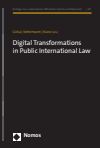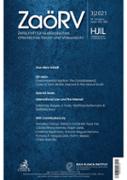Sie befinden sich hier: Forschung Archiv International Law and the Internet
Matthias Kettemann
Raffaela Kunz
What role does international law play for the internet? And how have the internet and the platforms, rogue actors, cyber weapons, and multistakeholder approaches to law-making influenced international law? More than ten years after the term “Internetvölkerrecht” (“international internet law” or “international law of the internet”) has been popularized, the myth of the internet as an unregulated space persists.
International law already forms part of the normative infrastructure of the internet, be it as a legal basis of the right to access to the internet, as a benchmark for assigning custodial sovereignty to a state with an important Internet Exchange Point, a yardstick for qualifying a state-led information operation via cyber channels as lawful or unlawful, or for determining the rights and duties of online platforms to delete hate speech. However, it remains an open question how international law can successfully fulfil its role as the ius necessarium of the internet, with, next to, or even against the several forms of transnational private and/or hybrid regulation which are emerging.
In light of the normative entanglement of actors and instruments at different levels of governance, international law and scholarship need to play a key role in the governance of the internet. How else could we successfully protect the public interest in the integrity of the internet and, conversely, mitigate the dangers stemming from misuses of the internet (e.g. the privatization of censorship, mass surveillance, and a perpetuation of global hegemonial power structures)? The coming decade will most likely see further attempts by states to develop their own ‘internets,’ controlled by national governments. What does this mean for the global internet, and can international law be used to stop its fragmentation?
Against this background, the “International Law and the Internet” project aimed to further explore the field, involving global scholars in a collective endeavour. A Call for Papers invited submissions for a special issue of the ZaöRV/HJIL and for an edited volume to appear in the institute’s “Beiträge zum ausländischen öffentlichen Recht und Völkerrecht” series published with Nomos. Such contributions approach the following macro-questions:
(1) What influence does ‘the internet’ (information and communication technologies and the socio-legal changes they have brought) have on international law and international legal scholarship?
(2) Conversely: What impact does international law – treaties, custom, principles, procedures, actors, legitimacy conceptions – have on the development (the fragmentation or integrity) of the internet? How does the geographical and geopolitical dimension of international law affect the unity and/or fragmentation of international internet law?
(3) Finally: How does the interface between international law and the internet affect the relationships and the power balance between the Global South and Global North, in terms of positive law, participation in processes of norm development, hegemonic structures in scholarship, and participation in the epistemic communities of international internet law?

